#this post brought to you by needing to write a scene where his religious affiliation matters and I'm going with disinterested Episcopalian
Explore tagged Tumblr posts
Text
Bruce Wayne: any religion you want, really
So for Reasons, I had to figure out Bruce Wayne’s religious affiliations or lack thereof. The resulting tangle was impressive, and mostly left me going, “Comics authors sure fail to think through the implications of their backstory decisions a lot!” I meant to do a full fancy post with a dozen citations. I have misplaced all of those citations and the hour has come, so I’m going to wing it and tell you what I’ve got with no evidence whatsoever. Anyone who wants to throw them on in replies (either “here’s the issue where” or “here’s a good clearinghouse article”) is obviously welcome.
1) The Waynes (historically) are definitely Episcopalian, both by the general religious affiliations of their location/race/class and the crosses in most depictions of his parents’ graves.
2) Frank Miller made him Catholic. But Frank Miller makes a lot of people Catholic. Most people who make him Catholic do so via his mother, and let Thomas Wayne stay Episcopalian.
3) Kate Kane is Jewish. Kate Kane, his cousin via his mother’s brother, is practicing Jewish with Jewish parents and had a Bat Mitzvah and everything. Kate Kane is almost definitely Jewish via a family tree that makes Bruce Wayne matrilineally Jewish, and the nature of that inheritance is he doesn’t have to claim it if he doesn’t want to, but yeah, he is as Jewish as he says he is. Even if he wakes up tomorrow feeling Jewish and has never said it before in his life.
4) Bruce Wayne claimed in a 2018 comic to have ditched faith when his parents died, so he can also be as atheist as you want him to be.
5) Bruce Wayne did the whole world-tour weeks-of-silent-meditation thing, so if you want him to have latched onto Zen philosophy, it’s entirely defensible; it doesn’t require belief in any new gods and the principle of Right Action is very large in his life whether or not he formally subscribes to it.
---
None of these things have to conflict except possibly “which one he subscribes to at this exact moment,” and even then several of them can stack. The stickiest possible point is his mother’s faith, and this is the very easy path that makes all of these things true, courtesy of my nerdy Canadian first reader, Maribou:
In Montreal in particular, and many other cities in general, there are both large Catholic and large Jewish populations, which were crammed close together by societal prejudice for a long time and which had multiple wealthy and powerful families of their own even under that stress, such as the Bronfmans. There were a lot of intermarriages, and a common result was children being encouraged to choose a religious path after a thorough education in their parents’ options. (Basically, “It’s time to schedule either your Confirmation or your Bat Mitzvah, which venue should we book?”)
So a Bronfman woman and a Kane man could easily have married and had a bunch of kids including Martha Kane and Jacob Kane. Martha may (or may not!) have picked a Confirmation. Jacob definitely picked a Bar Mitzvah. All of these things can be true.
When I was discussing this with a Jewish person, she said she knew of a relative of exactly Martha Wayne’s (original) generation who was practicing Jewish until her marriage to a Protestant and then just... never talked about it again. If she practiced, she practiced privately. It disappeared utterly from her public life. That was a not-uncommon occurrence in that era.
The odds are that Bruce was raised moderately-disinterested Episcopalian, by the matching crosses. But he is arguably an Episcopally baptized, matrilineally Jewish atheist who subscribes to Zen and has inherited a bone-deep taste for Catholic passion plays. All of these things can be true without even cancelling each other out.
In the words of Frank Miller (who I agree with for once), “He’s kind of like a diamond. You can throw him against the wall and you can pound him with a hammer, but you can’t break him. Every interpretation seems to work. [...] You can do it badly, but you can’t really do it wrong.”
#batman#bruce wayne#religion in comics#Batman: Millennials in Love#kate kane#my writing#this post brought to you by needing to write a scene where his religious affiliation matters and I'm going with disinterested Episcopalian#but I've been reading some heartrendingly sincere Jewish Bruce Wayne fic where he doesn't know what his mother would have wanted#and I see you and it's just as valid y'all#just imagine the awkwardness if bb Bruce wanted to pursue that heritage and Alfred who is already TOTALLY LOST#is trying to find him a mentor I guess but not his asshole uncle#bb Bruce and his completely over the top Bar Mitzvah#bb Bruce coming to shul with his giant brooding eyebrows and his Very Complete Homework#please write it I'll read it
747 notes
·
View notes
Text
Scoring Weed for The Dude
It was 2009 and I was hired as a writer for the Behind the Scenes footage of the Doorpost Film Project finalist event in Nashville. My primary job was to interview the 10 finalist filmmakers to get their take on the festival and some insight into their film projects.
My friend Steve was working as a production assistant on the gig and was responsible for taking care of the keynote speakers; making sure they were comfortable and had what they needed.
The principle keynote for the weekend was Jeff Dowd, the LA film producer that inspired the character of The Dude in the Coen brother's film The Big Lebowski. The executive producer, Shep, asked me to help Steve pick them up from the airport. He said it would help my work to meet them and get to know them for interviews later on.

The ride to the airport was stuffed with old school hip-hop. Steve and I raising the roof, creating characters and laughing. When we arrived at the terminal, he got out a little white sign with the The Film Project logo.
We went inside and stood next to baggage claim, Steve with his sign and me just posted behind him like some nerdy security detail. Cowboy hat after cowboy hat swarmed down the escalators peppered with businessmen in suits walking quickly on their phones. Guitar cases were colliding all over the place.
A line of slowly walking, wild-haired, flamboyantly dressed middle-aged men parted the Nashville seas of people and walked like Hollywood into the baggage claim area. The man in front, a bright, charismatic man, stepped right up to Steve.
“It looks like I’m with you, hot stuff,” he said, lightly petting his arm. Steve exploded into a smile and took one of his bags. The rockabilly guy slipped in and shook my hand.
“You guys are with The Film Project? Are you producers or just transport?”
“My name is Jon,” I said smiling and extending my hand.
“Dan,” he replied, shaking and smiling up at me.

“I’m a writer for the The Film Project. Helping them create content about the event and the talent. So I just wanted to meet you guys. Steve here is a production assistant with The Project, so he really knows more than me.”
A large man that was meandering behind the other two finally caught up. His cargo shorts were stained and the golf shirt cascading over his belly was spotted with various stains. He was not bearded but not shaven. Something in between. He shoved his suitcase into my chest. I accidentally took it.
“Jeff Dowd,” he announced, patting my shoulder. “Where’s the limo?”
Steve loaded everyone’s luggage into the Hummer. Dan climbed into the front, so I got in the back with Dowd, the flamboyant Charles, and a guy named Dean.
“So you’re a writer?” Dean asked. “Do you have a film in the competition? Something you wrote?”
“No, I work for The Project, I don’t have any work in the competition,” I answered.
“But you must have some interest in writing film to have taken this job.”
“True, I do. I write screenplays every now and then.”
“What’s your name again?” Dowd bursts into the conversation after being immersed in a text dialogue for several minutes.
“Jon,” Dean tells him.
“Jon, I’m wondering about my ryder. I requested an ounce of marijuana. Is that in my room? Are there any papers? Do we need to stop at a headshop on the way and get a device?”
“Uh, I’m a writer here. I don’t know anything about ryders or what is in your room. Steve might have a better idea. Steve?”
“Mr. Dowd, I don’t know anything about that either, but when we get to the hotel I’m sure the producer can tell you everything you need to know.”
“My guess is nobody’s getting you pot, Dowd,” said Charles.
“Well that might present some problems for me,” the Dude replied.
I went to the hotel bar to enjoy a nice rye when Shep’s hand rested on my back.
“Hey buddy,” he said.
“Hello sir,” I replied.
“Could I get two more of whatever he’s having?” Shepard asked the bartender.
The tender nodded and got to work.
“I need a favor,” Shep said.
“Okay. What favor?”
“Can you help me get some weed for The Dude?”
“What? Shep, we’re in Nashville. I mean, back in Jacksonville, of course, but I don’t know anyone here.”
“I know it’s a long shot, but maybe you can call a few friends? See what we can do?”
As it turned out, this event was run by an evangelical Christian hedge fund guy. He was the purse-strings. Shep knew he wouldn't approve and worried that it could upset the entire event if the filmmakers thought that a religious affiliation might influence the judging of the event.
Then I remembered that my brother often spent time at a hippie commune just outside of Nashville. It was a long shot that my brother would be in Nashville at that moment and actually had what The Dude needed. But he answered his phone, happened to be in Nashville, and was happy to help the infamous “Dude.”
“Bring him with you and it’ll be free,” he said.
I made this offer to The Dude. He was not particularly interested in a road trip to Murphreesboro and frankly didn’t care if it was free, because it was Shep’s responsibility to provide said grass.
So the mission was given to Steve and I. Steve had the Hummer and I had the connection.
So we drove out of Nashville and into the mountains outside of town. It was early afternoon when we arrived at Hippie Hill. We weren’t exactly sure when we had arrived. We followed signs from the paved roads up the dirt roads, which were still wet from recent rains, until we were driving up a mud road with trailers on both sides getting sprayed by our tires as we tried to go further. The Hummer was stymied and we felt guilty.
“Sorry!” Steve announced as people emerged from their mud-spattered homes while we walked further up the hill, leaving the Hummer in the middle of the road.
As we mounted the hill, we saw busses and teepees. A middle-aged man approached us.
“Can I help you with something?”
“We’re looking for my brother,” I announced. “His name is David.”
“We don’t know a David,” he replied.
“I think his Rainbow name is Shadow,” I said, Steve looking at me strangely.
“Oh shit, you’re Shadow’s brother? He’s right over there.”
At that moment a couple of dreadlocked kids emerged from the lilting fog.
“Are you Jon?” they asked.
We were ushered past a 2-story teepee and some busses that look like they haven’t been mobile since the Merry Pranksters and were now homes. When we climbed into the RV where my brother was supposed to be, we found a strange group of people looking stoned and bewildered. One guy with long dreadlocks asked where The Dude was. A woman wearing only a bikini, sweating out the heat, puffed on a joint and handed it to Steve. He took it and immediately handed it to me. I took it and acted like I hit it before handing it to someone else in the fragrant RV.
Then my brother appeared, a smug look on his face as he tossed his dreadlocks behind his shoulder, and the other hippies fell away like he was a Nordic god.
“Where’s The Dude?” he asked.
“He didn’t have time to ride out here,” I lied.
My brother gave us a fat bag of grass and we made some small talk with the forest nymphs that lived in that RV. We made our way out of the back door and went over to the fire pit at the vista overlooking the valley beyond the mountain. My brother lit a joint that looked more like a baby’s arm and Steve and I each hit it twice, watching the sun go down over the mountains, before we were cross-eyed stoned and decided to hit the road.
The Turtle
On the way down the mountain our only concern was listening to old-school hip hop until we realized we were traveling unusually slow down the mountain. Mostly because we were high, but we also started to see the roadside lawnmower shops and feed stores and realized we were very far from our comfort zone.
As we were realizing how foreign our environment was, we saw ahead of us a turtle trying to cross the road. This is where everything is confusing.
The way I remember it, we saw the turtle, swerved past it, and then Steve stopped the Hummer and announced that he was going to get the turtle out of the road. I didn’t understand the need, as we hadn’t seen another car on the road the whole way down the mountain, but if he wanted to be a hero, far be it from me to stop him. So he got out of the car, started walking back toward the turtle, and then realized how far back it was and how close it was to getting all the way across the street. Given those updates, he climbed back into the car and started down the road again. At that moment, a pickup truck came raging up from nowhere, splattered the turtle on the road, and got aggressively close to our vehicle, making violent gestures behind us rather than just passing us.
Steve freaked out and tried to pull off the road, because we were stoned as shit and in a rental car that the festival was responsible for, but the guys in the pickup saw us as game, and kept us from pulling off of the street by moving into the inside lane. Since the mountain edge was on the other side, we were sure we were going to die.
The way Steve remembers it, is he got out, walked back to the turtle, got it to the side of the road, then saw the truck coming fast from a great distance, jumped into the car and tried to speed up to stay ahead of the danger.
Either way, in retrospect, that may have been part of being high.
When we got to the bottom of the mountain, they roared off and we stopped at a gas station where locals assured us that everything that had happened to us was normal and boring.
The Dude Replies
When we got back the the hotel, we let the producers know we had come through. Jer, one of the producers, came down, got the bag, and brought it to The Dude, telling him the extent we;d gone through to get his weed.
“What do you want? Want me to fuck you for it?” he said. Jer didn’t seem to want that.
When I finally had the chance to discuss the adventure I’d been on with him, he said “those people are really doing it. They’re living it. The rest of us are just pretending.”
Then we karaoked all night and smoked many joints at the Christian founder’s mansion. Thanks Dude!
4 notes
·
View notes
Text
Reflections from the borderlands
I spent the month of February in Tucson, Arizona, a place unlike anywhere I’ve lived before—the bright colors, the huge cacti, the Southwestern culture so connected to the desert land and people. I’ll write another post about my explorations and travel recommendations, but wanted to share some observations about volunteering with one of the local groups working to end death and suffering for migrants in the borderlands.
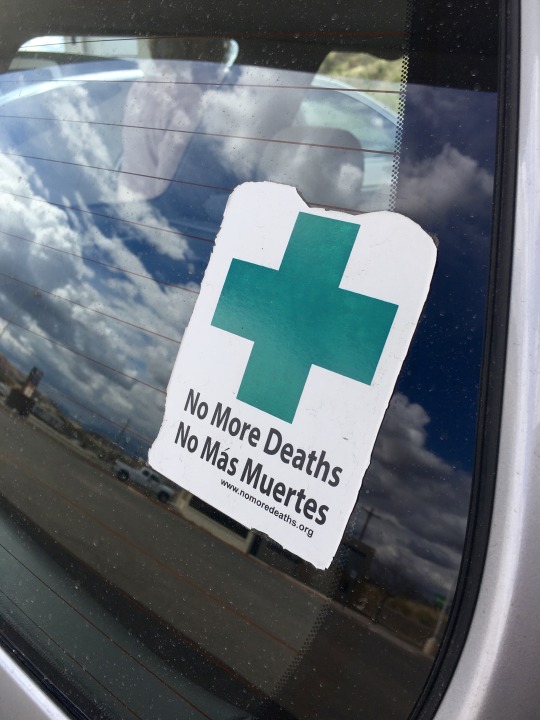
No More Deaths is a volunteer-run group that was started 12 years ago, and comes out of Tucson’s sanctuary movement in the 1980′s, when churches took in immigrant families to live in their sanctuaries so that they wouldn’t be deported. I’m back in Arizona now to join the group for a week at their desert camp on the border starting today. I’ve been with them twice to volunteer at a migrant aid center on the border in Nogales, Mexico, as well as to observe at Tucson’s Operation Streamline deportation court. These are my thoughts after my first visit to Nogales a few weeks ago. I joined my friend Nancy, a long-time No More Deaths volunteer, on her weekly trips to the “Comedor," a dining hall and migrant assistance center run by the Kino Border Initiative. A small building with tarps for walls just across the Mariposa crossing, migrants come for breakfast and dinner—both those who have recently been deported from the US, as well as others who've made it to the border and are getting ready to cross.
Though the space is run by the Catholic group, it serves as a hub for others to come to help migrants on the border: Volunteers from the Unitarian Universalist and Presbyterian affiliated No More Deaths go daily to help people make phone calls and receive money transfers; the Mexican Consulate has a representative to help people retrieve their belongings from US detention centers; and a group of local retirees with Samaritans came to distribute clothes, including a few nurses who provided first aid. Whether you're Catholic, another religion, or not religious, it's hard not to be humbled by this space, the enormity of what the migrants are experiencing, and the way the staff and volunteers are there to serve people and treat them with dignity. They emphasize that it's not a soup kitchen—migrants sit at tables as others bring them food, and people help in ways as small as a smile or pat on the back to as big as petitioning for asylum to get someone to the US.
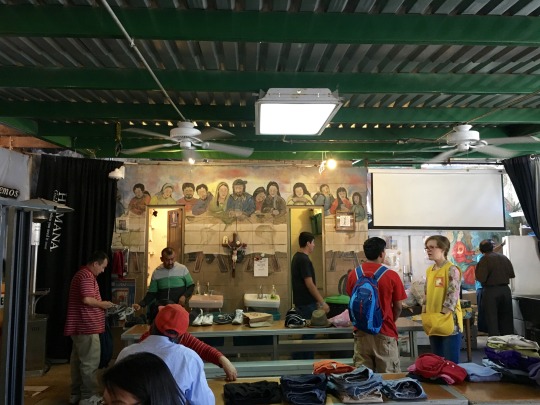
After getting by the greeter/bouncer in a yellow vest at the front door, we joined a darkened room of about 40 migrants and 15 volunteers and staffers. The migrants sat at picnic tables, mostly men from Central America and Mexico, a few women and children, and a few from Haiti (Haitians at the Mexican border...a whole different crazy story). They were watching a video with guys in cowboy hats talking in Spanish about knowing your rights. After the film ended, a woman who works at the Comedor took a microphone and spoke about human rights, saying "It's not just a dream in our hearts, it needs to be the reality." Then she went around the room with the mic, asking people to name one human right that the video talked about, or what was a right they had that had been violated, and what could you do about it. They were all hungry and eager for breakfast, but went along with it, giving answers and later clapping after different people spoke and made announcements. A priest said a prayer. The nuns told everyone which areas of town to avoid, where it was dangerous, to stay away from "la mafia" in certain areas. Nogales is not the safest place, and the Comedor workers don't want the migrants staying there for long, because they're walking targets for robberies and violence and scams (even though those who were recently deported often do want to stay in the town, to remain closer to US family). The nuns told everyone that there were people here with them today, us volunteers, to show they were not alone.
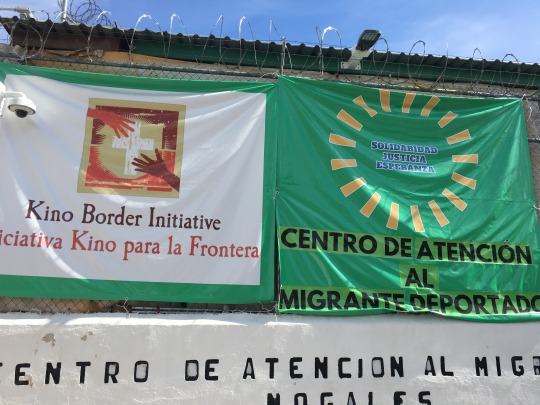
The group of retirees served everyone breakfast, and after they ate, we started with what I had come with my friend to do—helping those there make phone calls to friends or family. We had a few basic cell phones and would type in the country codes and numbers for them, then hopefully be able to get them connected (while also giving them gum we had bought at the gas station and/or a small kit of essentials for those who might be heading north).
The first guy to head our way had a neck covered in tattoos, and was more American looking than many of the other men in his jeans and a white t-shirt. We shook hands, introduced ourselves, and he told us he'd just gotten out of prison for 3 years in the US. He, like everyone else we met, was really nice and friendly and grateful. I settled in and got to work, signaling to the door guy each time we were ready for a new caller to come through. Another guy had lived in Phoenix for 25 years. So much of the rhetoric around these guys is that they're dangerous and scary—when in reality, migrants are the ones crossing or in the US because they want to work, earn money for their kids, or be with their family. It's *them* who are the targets of violence and have a reason to be scared.
Sitting there at a picnic table in the back of the room with the phones, the scene around us was a lively sort of chaos—the Samaritan retirees laying out all the clothes they'd brought, trying to size people up for what would fit them. One guy asked for "calcitines" (socks), as their feet get all blistered from so much walking. There were some intense moments—one guy, very bedraggled and covered in a torn up winter jacket, came over for medical assistance, and I tried to help translate. He slouched at the picnic table and said he'd been coughing up blood. The nurse looked at his throat and proclaimed it "all torn up," and went to find someone who could bring him to the Red Cross for antibiotics.
There were moments of lightness too. A little boy, maybe four years old, kept laughing and dancing around as his young father or uncle got his backpack ready and full of supplies. It being Valentines Day, the volunteers from Samaritans who were serving food had baked a yellow cake with pink and red hearts on it. One guy wished us "Feliz dia de San Valentin" with a grin after he made a phone call.
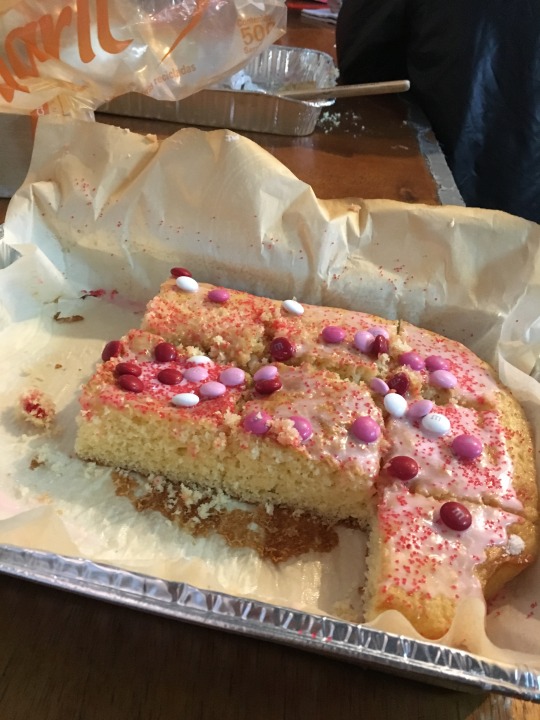
The most surreal part was the US border area. It had been re-done in 2014 with a $187 million pricetag, and was nice—really nice. There was art, footprints in the concrete, pretty vegetation and metal designs, curving pathways. A poem on glass by Arizona's poet laureate apparently inspired the architect of the complex: "The border is what joins us,/Not what separates us." Oh, and I saw *the wall.* Metal, some 15 feet high. There are areas where people can go and touch fingers and talk to relatives between it. But that's about the only humane thing about it.
Walking away from the border, my thoughts were: 1) It's good and important for us activists to get out from behind our computers more often and see some things and meet some people in the world we're wanting to change 2) American privilege is really real—and we need to step it up in the fight alongside immigrants and migrants and refugees to stop the raids and fear and insanity.
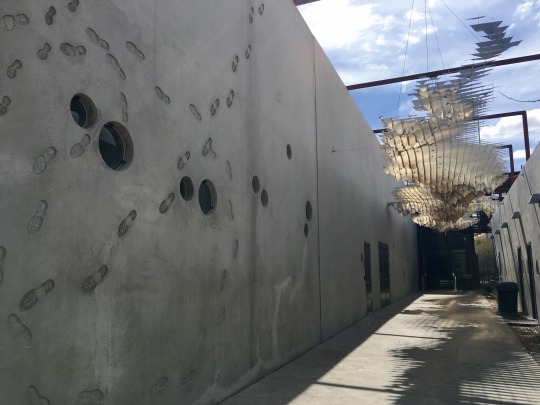
1 note
·
View note